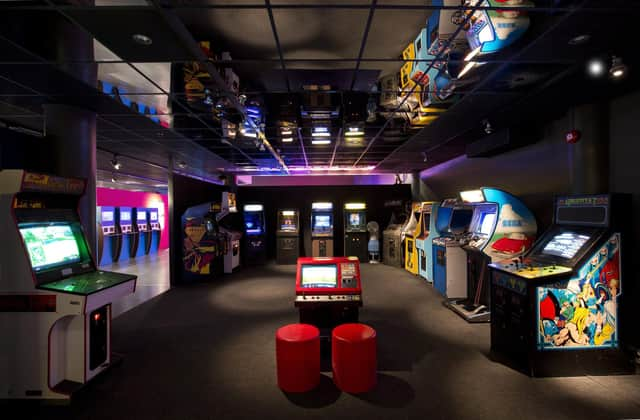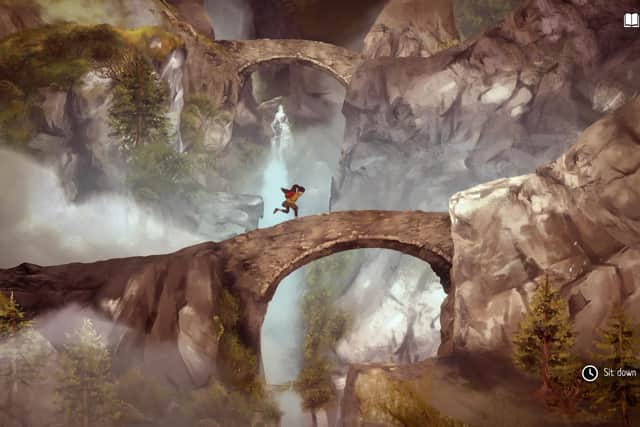From Lemmings to Grand Theft Auto: how Scotland revolutionised gaming


Think of Scotland’s most important exports and single malt whisky, fine seafood or North Sea oil and gas might come to mind. Video games can now be added to that list and Scottish talent is at the forefront of what has become the largest cultural industry in the world.
For decades Scotland has been home to some of the most important names in gaming who are creating influential titles and cutting-edge technology. Rockstar North – the Edinburgh-based developer behind global sensation Grand Theft Auto – is particularly well known, but in fact, there are currently over 100 pioneering and award-winning games companies in the country, contributing around £180 million to the Scottish economy.
Advertisement
Hide AdAdvertisement
Hide AdA new exhibition at the National Museum of Scotland celebrates this success. Game On brings together over 100 playable games spanning 50 years of games development. Alongside nostalgic 80s arcades and iconic characters like Sonic the Hedgehog and Mario, there will be innovative and award-winning independent games that demonstrate Scotland’s remarkable contribution to this global industry.


For centuries, Scottish scientists and engineers have been responsible for discoveries and inventions that have transformed our lives and changed our relationship with the world around us. As Keeper of Science and Technology at National Museums Scotland I am delighted to include Scotland’s revolutionary games sector in this story.
One of the earliest home computers, the Spectrum ZX, was manufactured in Dundee in the early 1980s. Over five million units were sold worldwide, making it one of the best-selling and most influential computers ever made. The popular device ignited a movement of likeminded individuals to start experimenting with games development.
In the decades that followed the city became a hub for early games pioneers. DMA Design, which would later become part of Rockstar Game, released the endearing puzzle game Lemmings in 1991. It was an international hit and helped establish Scotland as a world leader in game development. A sculpture celebrating the game’s success is installed near the firm’s former office in central Dundee.
The city’s Abertay University is now regarded as one of the best places in the world to study games design. Attracting international talent, many graduates have chosen to remain in Scotland to start their careers and set up their own games companies. This emerging generation of developers are pushing the boundaries of what you can do in a game, what stories you can tell and the diversity of those stories.


Dundee-based Sad Owl Studio’s unique photography-based puzzler Viewfinder was awarded best British video game at the 20th Bafta Game Awards earlier this year. Other Scottish-made games highlighted in the exhibition include the retro platformer Flea, which was created by LowTek, an independent company specialising in dyslexia-friendly games, and Phogs! a puzzle-filled adventure game, created by Bit Loom, featuring an adorable two-headed dog.
James Law, part of the creative team behind Phogs! describes the appeal of working as a developer in Scotland: “There is a wonderful scene of smaller teams and independent game makers. When we started Bit Loom in 2017, we chose to stay in Dundee where we had met during our studies at Abertay University. A big part of staying was the network of support in Scotland. It is hard to imagine having our home base anywhere else."
Advertisement
Hide AdAdvertisement
Hide AdReleased in May, Hyper Luminal’s cosy adventure story Pine Hearts is the most recent release that visitors will be able to play at the Museum. CEO Stuart Martin cites Scotland’s “gaming legacy and world class games education” as reasons for setting up the studio here.
Game On first came to Scotland 22 years ago. Developed by Barbican Immersive, the National Museum of Scotland was the exhibition’s very first touring venue in 2002, and it has since been visited by over five million people of all ages in 25 cities around the world.
In the last two decades computing technology has changed dramatically. Consoles like the PlayStation 2, Game Cube and Xbox dominated the market in 2002. We now have virtual reality and the ability to build completely immersive worlds. This technology has also had a wider influence and gaming has an important role to play in all our screen industries. Innovations in animation and special effects for TV and film are emerging from Scotland’s games industry.
Today, smartphones and tablets have also helped make games more accessible, attracting a wider range of players who might not think of themselves as traditional gamers. Improved internet access and speed support more co-operative and online multiplayer games than ever before, bringing friends, families and communities together over shared virtual experiences.
While technology has helped make games more immersive, at the heart of their success is good storytelling. The explosion of independent developers, in Scotland and worldwide, has led to the huge breadth of experiences now available. Players of all ages and abilities can find a world and a story that appeals to them, and the stereotype of gamers as teenagers locked away in their rooms is outdated, with gaming firmly established as part of mainstream popular culture.
Games like Minecraft transcend age barriers and encourage almost unlimited creative play. The popular world building game is also another surprising Scottish success story. Created by Swedish developers Mojang for PC, it was adapted for consoles like PlayStation and Xbox by Scotland-based 4J Studios. Minecraft went on to sell over 300 million copies globally, becoming one of the most popular games of all time.
Like Minecraft, games made today often feature huge, immersive worlds. They offer players a cinematic experience; breathtaking surroundings, evocative storytelling and characters who gradually develop and grow.
Advertisement
Hide AdAdvertisement
Hide AdScotland’s landscapes lend themselves to this filmic storytelling, from Lara Croft’s adventures around Loch Ness in Tomb Raider and Nathan Drake’s search for treasure in the Scottish Highlands in Uncharted, to racing luxury cars through Edinburgh in Forza Horizon. The independent title A Highland Song brings together not just Scottish scenery, but Scottish voices and music as well. Players adventure through the spectacular Scottish Highlands, moving to the beat of songs by multi-award-winning folk groups Talisk and Fourth Moon.
The Scottish games we’ve chosen to highlight in the exhibition showcase an emerging generation of truly innovative developers. They demonstrate the role gaming plays in our lives, and the benefits that gaming has been shown to have beyond simply providing entertainment. They are used in education to make learning more effective and as a means of raising awareness of issues such as sustainability. Gaming can also have a role to play in improving mental health through mindfulness, helping people connect and creating communities.
It’s exciting to think about what could change in the next 20 years. The future of the games sector in Scotland will be a direct reflection of who we are as a society and what kind of technologies we will have to tell our stories.
Dr Geoff Belknap, Keeper of Science and Technology at National Museums Scotland
Game On is at the National Museum of Scotland in Edinburgh from 29 June to 3 November 2024. Tickets are available to book at www.nms.ac.uk/GameOn